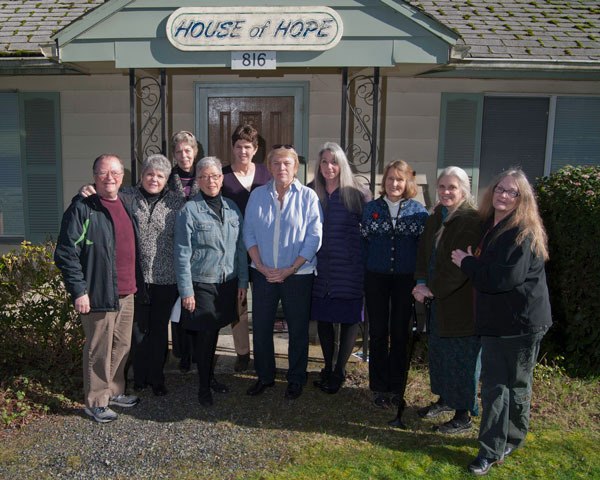Within the past year, about 60 people, at least one-third of whom are children, have called Langley’s House of Hope home.
The house is the city’s first and only transitional housing facility for homeless individuals and families. It operates on the 90-day rehabilitation model, with an average stay of about 60 days.
“It’s been a year of discovery and learning and a lot of satisfaction of what this really offers to people needing to make a change in their lives,” said Faith Wilder, board president of the South Whidbey Homeless Coalition, which owns and operates the house.
Though the house has undoubtedly been a success, Wilder and fellow coalition members have no intention of stopping in pursuit of their mission to significantly reduce or eliminate instances of homelessness in the community.
“We’d like to work ourselves out of business,” Wilder said.
In order to fund their efforts, the coalition will hold a fundraising event entitled “Building Hope Together” from 4-7 p.m. Saturday, May 14 at Saint Augustine’s in-the-Woods Episcopal Church. The event will include a barbecue chicken dinner, no-host bar, live music and a silent auction.
Tickets cost $25.
Proceeds will benefit the coalition’s mentoring program, as well as its long-term endeavor to secure affordable housing for community members with exceedingly low incomes.
Through the mentoring program, the coalition offers additional support to individuals and families once their stay at the house has ended.
Many of the issues residents face persist beyond the 90-day term, Wilder explained.
“They need coaches in managing life issues, and partnerships to help them kind of study themselves along the way,” she said. “Our goal of this mentoring program is that none of our people ever return to homelessness.”
To accomplish this, the coalition makes a six-month commitment to meet with individuals weekly, establishing new goals and discussing new topics.
Pertaining to securing affordable housing, one route the coalition is exploring is the “master lease” concept, in which the coalition is the tenant, with families of exceedingly low income doubled up in the residence.
“That will create rental opportunities for families who would never have enough money in our rental market,” she said.
The coalition is also on the lookout for unoccupied homes they could repair for the owners under the condition the home then be rented to the coalition under a master lease.
Though two offers for the latter have surfaced thus far, Wilder said both homes required extensive structural renovations. It was just too much, she said.
Wilder explained that the coalition also has a long-term goal of establishing a tiny house village on the House of Hope property, which is a double lot. The houses would be similar in structure to those built for transitional homeless housing in Seattle, though those in Langley would be available for tenants to rent long-term on a sliding scale basis.
The studio-style houses would include plumbing and electricity.
Ideally, the coalition hopes to open the first of the tiny houses for residency in early 2017.
Architect Mike Burroughs is offering his services pro bono to draw up the blueprints for the structures, and the construction will be done by volunteers.
Wilder said coalition members will work with Langley City Hall to ensure the buildings are in compliance with city codes.
In an interview Monday afternoon, Mayor Tim Callison expressed his support for the coalition and its work.
He noted that tiny houses are not specifically mentioned or allowed in the Langley municipal code, but auxiliary dwelling units no more than 975 square feet are permitted on properties where a residential home is situated.
He foresees the topic of tiny homes being addressed as the city council begins the process of reviewing and updating the comprehensive plan.
Specifically, he said, there is a section concerning affordable housing. State policy requires that some measures are taken to ensure residents have access to affordable housing, and tiny houses may be discussed as one such possible option.
“We are constantly reminded of the generosity and the heart of this community,” Wilder said. “Everything that we needed, somebody has shown up to help us. Without that, we wouldn’t be accomplishing anything.”



